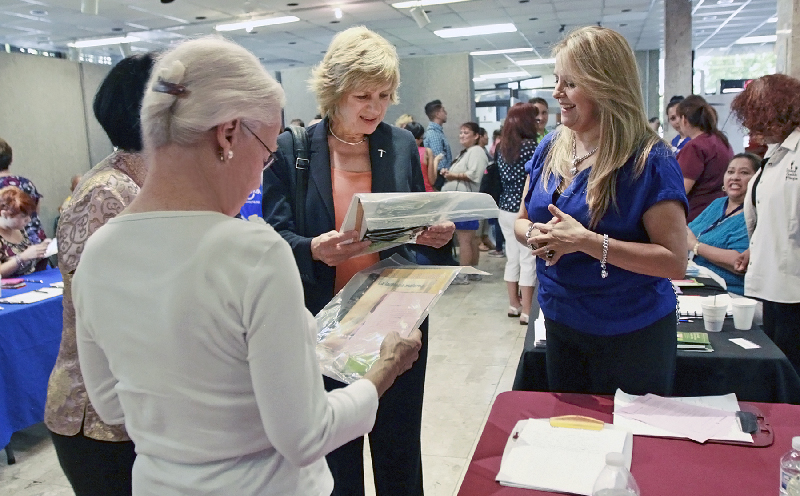Originally published July 17, 2015
By Laura L. Acosta
UTEP News Service
The University of Texas at El Paso and the General Consulate of Mexico in El Paso recently renewed their partnership to provide health-related resources to the Hispanic and Mexican communities in the Paso del Norte region through the Ventanilla de Salud program, a health collaborative established by the Mexican government.
On July 7, UTEP President Diana Natalicio, College of Health Sciences Dean Kathleen Curtis, Ph.D., and Consul General of Mexico in El Paso Jacob Prado signed a Memorandum of Understanding, which allows the College of Health Sciences to continue to administer the consulate’s highly successful health care program for a third year.

The Mexican government also provided $45,000 to fund the College of Health Sciences’ operational costs for the program.
Since 2012, the Ventanilla de Salud has improved the health of thousands of residents in the community, provided clinical learning opportunities for UTEP students and saved lives.
“It is through this system of information that we have created a culture of healthy habits to prevent illnesses that normally affect Hispanic communities in the United States,” Prado said during a press conference at the Mexican Consulate in El Paso.
Ventanilla de Salud includes 86 community organizations and local health agencies that connect people with the appropriate health and social services in El Paso, New Mexico and Juárez.
Between June 2013-2014, the program has provided health related services to 24,615 people; hosted 282 educational talks on health topics, such as healthy eating and nutrition; participated in 18 community health fairs; and sponsored 12 clinic days at the consulate that attracted 3,228 people.
“This Ventanilla de Salud program is concrete evidence of the investment that we are making as a University in providing expertise and leadership to a program that has benefited thousands of people overall,” President Natalicio said. Because it’s not just the clients who come for the services but their families and everyone whose lives they touch.”
“In the end,” President Natalicio added, “it’s our students who benefit as well because they get the experience of working in a real setting with real clients and learning what it is to do community health.”
Health sciences students from health promotion, clinical laboratory sciences and social work have participated in educational talks, health fairs and the consulate’s clinic day.
Held the first Tuesday of every month, clinic day offers free health screenings, such as blood pressure, cholesterol, body mass index, Hepatitis C, HIV and other preventive exams. Participants also receive referrals for mammograms, colorectal exams and coupons for vaccinations.
“(The Ventanilla de Salud) model is something that our students are taking with them after they graduate,” Curtis said. “Instead of just learning how to educate or how to provide a service they learn how to do this in other communities and how they can organize those services for vulnerable populations that might not have access to health services, which is a very important part of their education.”
During May’s clinic day, Sandra Hernandez, a recent graduate from the Familias Triunfadoras community health worker training program at UTEP, obtained referrals for a colonoscopy and mammogram.
“I wouldn’t have access to these services anywhere else,” Hernandez. “There are a lot of organizations that offer different services and it’s easy to connect with the health services that you are interested in.”
Since February, the Ventanilla de Salud has conducted 350 individual health assessments, which include BMI, height, weight, glucose screenings, blood pressures and oxygen readings. Out of these, 304 people have been referred to health services.
“Through these assessments we are learning more about the health status of people who seek the program’s services,” said Eva Moya, Ph.D., assistant professor of social work. “We’re finding out if you have insurance, if you smoke and what your health risks are. We refer you to health and human services and we follow up with you two or three times to see if you were successful in obtaining your health services. We do more than just give you information.”